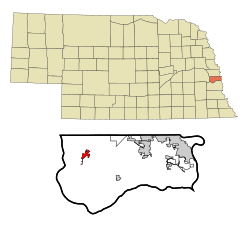Gretna, Nebraska
| Gretna, Nebraska | |
|---|---|
| City | |
 Location of Gretna, Nebraska |
|
| Coordinates: 41°8′20″N 96°14′42″W / 41.13889°N 96.24500°WCoordinates: 41°8′20″N 96°14′42″W / 41.13889°N 96.24500°W | |
| Country | United States |
| State | Nebraska |
| County | Sarpy |
| Area | |
| • Total | 2.10 sq mi (5.44 km2) |
| • Land | 2.10 sq mi (5.44 km2) |
| • Water | 0 sq mi (0 km2) |
| Elevation | 1,270 ft (387 m) |
| Population (2010) | |
| • Total | 4,441 |
| • Estimate (2013) | 5,584 |
| • Density | 2,114.8/sq mi (816.5/km2) |
| Time zone | Central (CST) (UTC-6) |
| • Summer (DST) | CDT (UTC-5) |
| ZIP code | 68028 |
| Area code(s) | 402 |
| FIPS code | 31-20260 |
| GNIS feature ID | 0829697 |
| Website | http://www.gretnane.org/ |
Gretna is a city in Sarpy County, Nebraska, United States. The population was 4,441 at the 2010 census.
Gretna started shortly after the Burlington Railroad built a short line between Omaha and Ashland in the summer of 1886. Advent of the village of Gretna on this new laid rail line was the cue for the exit of the nearby trading post of Forest City, which had existed since 1856. In its day, Forest City, located 2.5 miles southwest of where Gretna now stands, was a flourishing and busy place, but it was doomed by the rail road which passed it by. The only marker that exists today to show the site of old Forest City is the cemetery (Holy Sepulcher) which is located a little to the east of what was the center of activity in the settlement. Names that were prominent in the beginnings of Forest City were the families of William Langdon, John Thomas and John Conner.
The Lincoln Land Company, recognizing the potential of the site, surveyed and platted the town site of Gretna in 1887. The village was incorporated by July 10, 1889. The name suggests Scotland's Gretna Green, the ancestral county of some of the earliest settlers.
Gretna is located at 41°8′20″N 96°14′42″W / 41.13889°N 96.24500°W (41.138898, -96.244947).
According to the United States Census Bureau, the city has a total area of 2.10 square miles (5.44 km2), all of it land.
As of the census of 2010, there were 4,441 people, 1,594 households, and 1,139 families residing in the city. The population density was 2,114.8 inhabitants per square mile (816.5/km2). There were 1,671 housing units at an average density of 795.7 per square mile (307.2/km2). The racial makeup of the city was 97.4% White, 0.6% African American, 0.1% Native American, 0.5% Asian, 0.3% from other races, and 1.1% from two or more races. Hispanic or Latino of any race were 1.6% of the population.
...
Wikipedia
